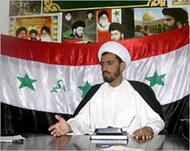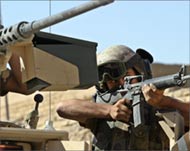Explosions near Najaf’s Imam Ali mosque
“Massive” explosions have shaken the old quarter of Najaf as reports emerge that Shia leader Muqtada al-Sadr has ordered his militiamen to leave the holy shrines.

The reports indicated that the militia were to relinquish control of the Imam Ali mosque to Shia religious authorities.
Aus al-Khafaji, an al-Sadr office director in Nasiriya, confirmed the report in a telephone interview with Aljazeera.
He also appealed to the Vatican to urgently intervene to prevent a “massacre at a holy shrine”.
Never the less, fighting in the mainly Shia city has continued. Aljazeera reported that an intense artillery barrage, hit the cemetery, the old sectors of the city, and around the Imam Ali mosque in the early hours of Friday morning.
Reuters reported that US AC-130 gunships may have also taken part in the latest attack on the city.
The escalation in military activity in the city came hours after interim Prime Minister Iyad Allawi issued “a final call” to Shia leader Muqtada al-Sadr to withdraw his besieged fighters.
“This is the final call for them to disarm, vacate the holy shrine, engage in political work and consider the interests of the homeland,” Allawi said in Baghdad, referring to the militia.
US might
Earlier, Apache helicopters backed US tanks and marines besieging the Imam Ali mosque complex where al-Sadr’s militiamen have been entrenched.
Thick smoke rose over the district as gunfire and explosions reverberated around the mosque. But the fighting eased after about an hour, suggesting an all-out assault is yet to come.
The refusal of al-Mahdi Army’s fighters to surrender their encircled position poses a dilemma for Allwai and his US backers. The Imam Ali mosque site is widely revered, especially by Shia believers, and a US-led attack on it risks inflaming Muslim opinion inside Iraq and beyond.
Elsewhere in the city, eight people were killed, at least five of them policemen, and dozens wounded when mortar bombs struck the city’s police headquarters, officials said.
US aircraft also bombed the Dawha Hotel in Najaf but there were no immediate report of casualties.
Ultimatum rejected
The upsurge in fighting came within an hour of an announcement by a senior al-Sadr aide rejecting an ultimatum from the interim government for the Shia leader to withdraw his forces from Najaf and disband his militia.
 |
|
Al-Sadr wants to finalise peace |
The head of al-Sadr’s office in the southern Iraqi city of Nasiriya, Aus al-Khafaji, told Aljazeera that the Shia leader had refused to accept a list of tough conditions set out a few hours earlier by Minister of State Kasim Daud.
But al-Sadr’s spokesman from Najaf, Shaikh Ahmad al-Shaibani, told Aljazeera his movement still sought to finalise a peace agreement with the government.
Speaking earlier in Najaf, Daud, announced “final-hour conditions” that he said the Shia leader had to meet and warned that “military action is imminent”.
Tough conditions
Effectively calling for a complete surrender, Daud said al-Sadr would be required to announce in person at a press conference that he would disband the al-Mahdi Army.
|
“Military action is imminent” Minister of State Kasim Daud |
Al-Sadr would also be required to hand over the militia’s weapons held anywhere in Iraq, permanently renounce violence and release all detainees, including Iraqi police, soldiers and national guardsmen, “otherwise the coming hours will be decisive”.
Iraqi government officials have dismissed as “trickery” calls from al-Sadr for a negotiated settlement, saying their patience has been exhausted.
But al-Sadr aides say the Shia leader has already accepted a peace deal brokered by a delegation sent by the Iraqi National Conference earlier in the week, saying that the interim government of Prime Minister Iyyad Allawi was blocking the accord.
Controversial offensive
“We have been preparing for a military offensive for five days to put an end to this crisis,” Daud said.
 |
|
US troop presence in Najaf has |
But such an attack on Najaf’s Old City – which houses the revered Imam Ali mosque and shrine – remains highly controversial. Recent fighting in the area has inflamed Muslim opinion across the region, especially among Shia believers who view the site as sacred.
The presence of US forces in such an offensive on a revered Muslim site is seen as especially inflammatory, prompting the Iraqi government to insist its own troops will lead any attack.
US marines and tanks have been positioned within 200 metres of the Imam Ali mosque for several days.
A mortar attack on a police station elsewhere in the city on Thursday killed five people and wounded 21 others, police said.